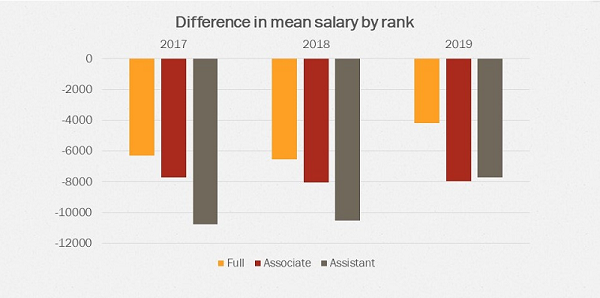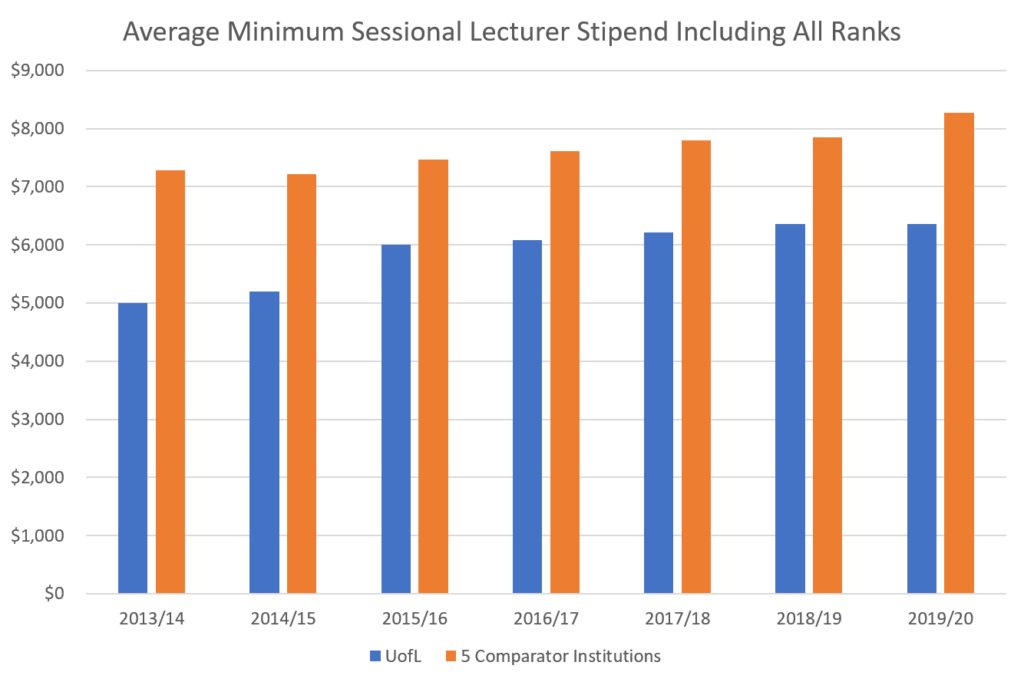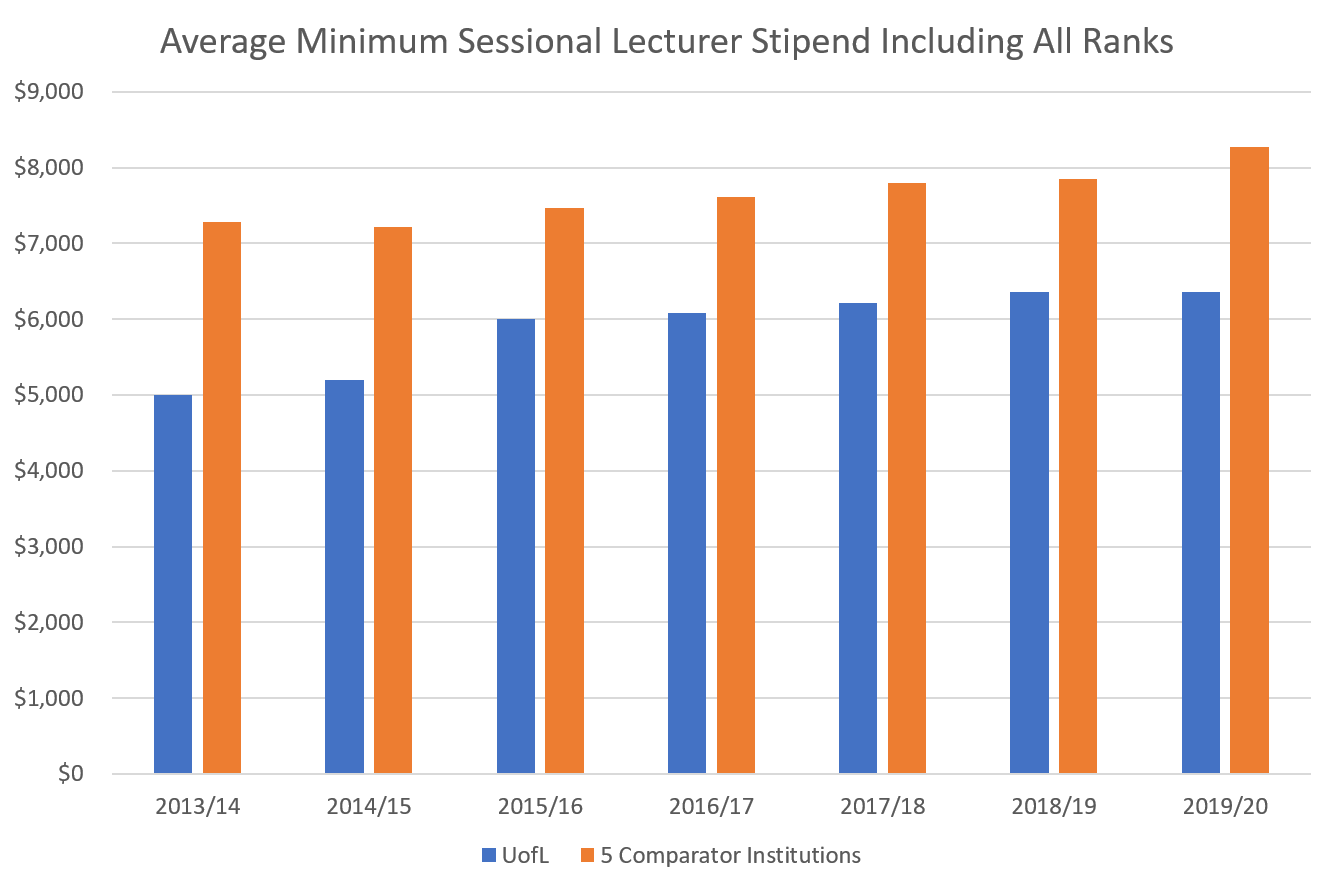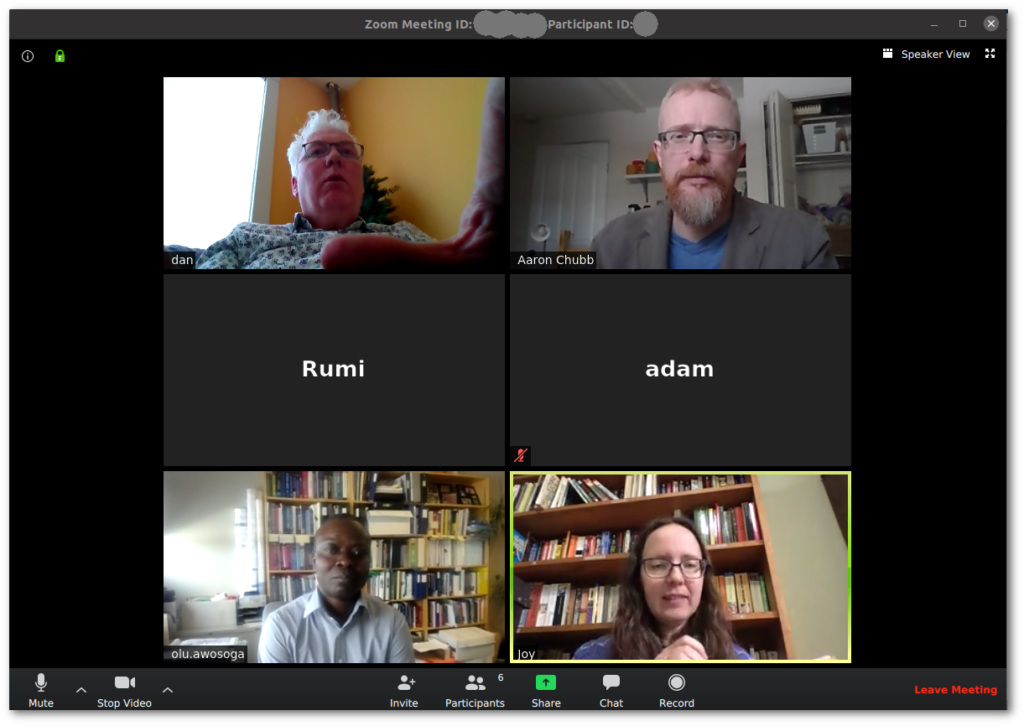Jul 24, 2020 | Bargaining, News
Negotiating teams representing ULFA and the Board met on Monday to discuss extending the 2018-2020 Collective Agreement for a period of between one and three years. The result of this meeting was an agreement to meet again in mid-September, at which point the teams will either attempt to finalise a contract extension or begin exchanging language as part of negotiations for a new collective agreement.
The prompt for the discussion was a draft Memorandum of Settlement prepared by ULFA. This was a proposal to extend all terms and conditions in the current Collective Agreement for an additional year. Under this proposal the new end date of the Collective Agreement would be June 30th, 2021 (instead of the current June 30th, 2020) and all other dates would be adjusted accordingly. All other terms and conditions would stay in effect without modification. The purpose of the proposed extension was to provide certainty to both management and the union during the unprecedented COVID crisis.
During their two hour videoconference, the two sides compared notes on the current national, provincial, and institutional situation, discussed various approaches to continuing bargaining, and explored different options for extending the current agreement for periods ranging from one to three or more years.
The Board team indicated that it would bring the key points of Monday’s discussion to its larger team and, potentially, the Board of Governors, before getting back to the ULFA team.
Prior to this meeting, the Board had advised ULFA of revisions to its negotiating team due to changing positions in the university administration. The new Board negotiating team still includes Dr. Chris Nicol as Chief Negotiator and Ms. Linda Van der Velde from Human Resources. They are joined by new members Dr. Mary Ingraham and Dr. Kelly Williams-Whitt.
Jun 8, 2020 | Bargaining, News
Background
On June 4, ULFA’s Negotiating Team met with the University of Lethbridge Board of Governors’ Negotiating Team. The meeting was conducted virtually using the Zoom platform. With our Collective Agreement set to expire on June 30, 2020, ULFA had issued a Notice to Bargain on April 16. The Alberta Labour Relations Code calls for an initial meeting to be held within 30 days, but the difficulty of coordinating schedules under the COVID crisis resulted in delays to the timing of this meeting.
ULFA’s Negotiating Team consists of Dan O’Donnell (Chief Spokesperson), Olu Awosoga, Rumi Graham, Adam Letourneau, Joy Morris, and Rob Sutherland, with Aaron Chubb as a resource person. Mary Kavanagh and Claudia Steinke also joined this meeting as observers, and Eva Cool joined as an additional resource person to help with technological issues.
The Board’s Negotiating Team consists of Chris Nicol (Chair), Robert Wood (Vice-chair), Michelle Helstein and Linda van der Velde. Dr. Wood and Dr. Helstein were unable to attend this meeting.
The intent of this first meeting is to establish protocols and introduce negotiations. According to the Labour Code, the parties must exchange their first proposals at a subsequent meeting, to be held within 15 days, unless they mutually agree otherwise.
What Happened
The meeting was very cordial in tone. Both sides acknowledged the challenges and uncertainties we are currently facing on many fronts.
The Board advised ULFA that due to a series of new appointments recently announced in senior administration (in particular the appointment of Dr. Wood as Acting VP Research and the appointment of Dr. Helstein as Acting Vice-Provost), there may be changes forthcoming to the composition of their Negotiating Team. They will advise us when any decisions are made.
In response to a request by the Board, ULFA clarified that in its proposal (from the Notice to Bargain) to extend the end date of our Collective Agreement, we had a one-year formal extension of the Collective Agreement in mind. While we are prepared to begin negotiations otherwise, as required by the Code, a formal extension would recognise and accommodate the unique situation we are in.
The sides mutually agreed to extend the 15-day deadline for the next meeting, with a goal of meeting again in three to four weeks. In the meantime, ULFA will prepare a draft Memorandum of Understanding formally extending the end date of our Collective Agreement for consideration.
Apr 30, 2020 | Bargaining, News
On April 16, the ULFA Negotiating Team and Executive served its notice to commence bargaining on the University of Lethbridge Board of Governors.
Important rules governing the serving of such notices and their impact on negotiations and the effect of the Collective Agreement are found in Division 10 and section 130(1) of the Alberta Labour Relations Code.
In light of the COVID-19 emergency, ULFA proposed extending the end date of the Collective Agreement as part of its Notice. Such pauses in negotiations during these uncertain times are quite common in the University and other sectors across Canada, and are recommended by various trade and labour associations. It is ULFA’s belief that delaying the start of negotiations in this way would be beneficial to both parties in light of the great uncertainty, change, and opportunities affecting the sector.
The Board of Governors Negotiating Team has indicated that they expect to respond to our Notice shortly.
Apr 23, 2020 | Bargaining, News
After a good discussion at the Annual General Meeting, held on April 6, the ULFA membership approved a bargaining mandate for the ULFA negotiating team with 94% of the membership in favour.
The bargaining mandate was prepared by ULFA’s Bargaining Resource Committee following extensive consultation, including approximately 100 one-on-one member interviews, several town halls, and a survey completed by roughly ¾ of the membership. Aspects of the draft mandate were discussed with members of the Gender Equity and Diversity Committee. The draft mandate was then provided for comment to the Negotiating Team, which will carry out the actual negotiations, before being finalised, approved by the Executive Committee, and presented to the membership for a vote at the Annual General Meeting.
The complete Bargaining Mandate is included below, the highlights include:
Demands to address salary and benefit erosion that has occurred over the past several years.
As Bob Barnetson has noted in his blog, Alberta public servants of all kinds, including ULFA members, have seen no cost of living increases since 2017, resulting in an erosion of spending power relative to inflation of at least 3.7%. ULFA members have also lost relative to their colleagues at peer institutions. Uniquely among the faculty of the province’s Comprehensive Academic and Research Universities (CARUs), U of L faculty took a 1% wage rollback to assist the University during the last Conservative government budget cutbacks in 2013. The U of L consistently underperforms its main comparators in terms of faculty compensation at all ranks.



 The five comparator institutions, agreed upon with the employer, are UofA, UofC, Trent University, UofR, and UofS.
The five comparator institutions, agreed upon with the employer, are UofA, UofC, Trent University, UofR, and UofS.
Demands to address deficiencies in benefits
There has been little progress in addressing problems with our benefits over successive rounds of negotiation. The members have consistently noted the shortcomings of our vision care and dental care benefits. There is also a clear inequity where benefits are reduced when two parents are Members of ULFA. Finally, professional development funds should be restored for tem instructors and created for sessional lecturers for each course they teach.
Demands to address workload
After much discussion, the Membership has determined to maintain current workload and to achieve equitable workload assignments for all Members. To support this demand, ULFA must receive clear data on workload levels across all units and faculties.
Demands for Equity, Diversity, and Inclusion
Key elements of this part of the mandate include: creating a joint ULFA-Board committee to evaluate and address salary inequities related to diversity; implementing bias training for personnel committees and for Academic Administrators, Chairs, and Directors; ensuring that student evaluations are not used summatively to measure teaching effectiveness (rather, that they are used formatively by Members for improving instruction and as an indicator of the student experience); eliminating binary language from the Collective Agreement; and improving language concerning the evaluation of service and research conducted by Indigenous Members and Members who work with Indigenous peoples.
Demands for improvements in Collegial Governance
It has been repeatedly noted that the effectiveness and breadth of Members’ roles in collegial governance has been eroded over many years. This has led to a demand to increase Member representation in decision-making processes throughout the University.
Demands for an Instructor path to the Professoriate
Many Instructors establish themselves in a leadership role in teaching and teaching research. A path to a multiple-rank teaching Professoriate should be defined for those Members.
In light of uncertainties concerning funding levels, enrolment rates, and novel instructional demands, these are challenging times for negotiations with the Board. It is significant that during such times, the Membership has so clearly expressed its goals with such strong support and has publicly charged the Negotiating Team with achieving improvements in those areas that matter to them.
Complete Bargaining Mandate
Schedule A: Salary Schedule and Stipends
Address the erosion of salary and stipends in relation to the cost of living over previous years, and address the difference in salary and stipends relative to comparator institutions. Merit and career progress for Members on reduced load calculated in a more equitable way.
Schedule B Benefits
Address problems with benefits, particularly with vision care and dental care. Address inequities to benefits when both parents are Members. Restore professional development funds for term instructors. Create a professional development fund for sessional lecturers on a per course basis.
Workload
Maintain current level of work and seek equity in workload assignment.
Negotiate ULFA receiving clear data about the factors at the department/program/area level that influence workload.
Equity, Diversity and Inclusion
Strike a joint ULFA-Board committee to evaluate and address salary inequities related to diversity.
Implement bias training for senior academic administrators, Chairs and directors, STP members, and search committee members.
Ensure that student evaluations of teaching are not used summatively or to measure teaching effectiveness but can be used formatively or for feedback on the student experience.
Implement appropriate parameters for fairly evaluating the specific nature and demands of research, service, and public duties for Indigenous Faculty Members.
Implement appropriate parameters for fairly evaluating the specific nature and demands of research, service, and public duties for those who conduct work with Indigenous people.
Change binary gendered language to more inclusive terminology throughout the Collective Agreement.
Collegial Governance
Improve ULFA representation on governance bodies including an appointed seat on the budgetary advisory committee; and increased decision making by Faculty Members on staffing priorities in academic areas.
Other STP Issues
Negotiate a salary increase tied to tenure and promotion.
Include service explicitly as a criterion for promotion and tenure.|
Negotiate promotion to associate professor as an automatic consequence of the award of tenure.
Information and Security for Union
Secure additional paid course releases and cash for ULFA.
Add @uleth email addresses to the data received in 6.03.1.e.
Article Defining Instructor Route to Professoriate
Create a category of teaching professoriate, with assistant, associate, and full teaching professor ranks, which is available only to instructors who show leadership in teaching and teaching research.
Schedule S
Rationalise and reorganize the Collective Agreement along the lines of Schedule S.
Mar 17, 2020 | Bargaining, News
The ULFA Negotiating Team met today to review a draft of the proposed mandate for 2020 negotiations as prepared by the Bargaining Resource Committee (BRC). As a result of measures taken in response to the COVID-19 epidemic, the team met via the Faculty Association’s Zoom account.
With the exception of some additional clarifications surrounding protections for Indigenous research and researchers, the broad shape of the proposed mandate appears to be complete. Final tweaks will be made over the next two weeks by the Bargaining Resource Committee, before the entire package is presented to the Membership at the Spring AGM (April 6, to be held via Zoom).
 6/7ths of the ULFA Negotiating Team… not behind a table, for a change.
6/7ths of the ULFA Negotiating Team… not behind a table, for a change.
Mar 12, 2020 | Bargaining, Know Your Rights, News
Some members of our bargaining unit have recently approached members of the ULFA executive to ask about job security for members of the Academic Staff. The following document discusses the provisions of our collective agreement that protect members against layoffs and termination.
Probationary, Continuing, and Tenured members of our bargaining unit are protected by the provisions of Article 25. This requires a declaration of a financial emergency or a program redundancy by the university before any such member may be terminated (i.e. laid off). In the unlikely event of a declaration of such an emergency or redundancy, moreover, probationary, continuing, and tenured members of the faculty are further protected by seniority, recall, and retaining rights.
The requirements for declaring a “financial emergency” or “program redundancy” are, appropriately enough, very onerous and do not lead to large or easy savings. They involve the mandatory involvement of the Association in what is a public decision-making process. There are also checks and balances in place to prevent the Board from repeating this process arbitrarily.
ULFA has at the moment no reason to believe that the Board is in a state to declare either a financial emergency or program redundancy. It will also defend the interests of its members to full extent of the Collective Agreement in this and all other eventualities.
Financial emergency
The process by which a “Financial Emergency” is declared involves multiple steps including the formation of a required joint management-union committee and report to review the situation and the proposed remedies, including any layoffs or reassignments.
This section of the Collective Agreement was revised last round of bargaining. Some key points:
- Before a Financial Emergency can be declared, the Board of Governors and Faculty Association must create a joint Financial Emergency Commission (FEC) consisting of 2 Association Representatives and 2 Representatives from the Board of Governors, plus an independent chair, selected by mutual agreement or appointed by the director of mediation services for the province under the labour code.
- The FEC is required to verify
- Whether a financial emergency exists; and
- That the Board of Governors have made a good faith effort to avoid the declaration through a number of common methods (redeployment, revenue enhancement, leaves of absences, early retirements, and so on.
- The FEC minutes are to be made available to members of the University community and may include oral evidence.
- The FEC is required to report within 35 working days of the President’s notice that an emergency may exist. This report shall indicate whether the FEC agrees a financial emergency exists, a recommendation of the amount of reduction required, and a recommendation of the amount, if any to be recovered through termination or layoff.
- After this report, the Board and the Association may renegotiate any relevant articles in the collective agreement or reach other mutually acceptable provisions in order to avoid a state of financial emergency.
- Only if the negotiations in 5 fail, may the Board of Governors finally decide whether a state of Financial Emergency exists that requires layoffs from the probationary, continuing, and tenured faculty.
- If the Board decides a financial emergency does not exist as a result of the preceding, it may not give notice for substantially the same reasons for a period of at least 12 months.
Program redundancy
Program redundancy is a process by which individual majors are declared redundant, resulting in one or more positions occupied by probationary, continuing, or tenured members being declared unnecessary.
In this case, the Board must first receive a recommendation from GFC and members of the academic unit(s) affected must be first given a chance to comment to GFC on the proposed redundancy.
In the event of a request from the president to make a program redundant, a Redundancy Committee must be struck including
- A Chair appointed by GFC,
- 2 members + 1 alternate appointed by GFC;
- 1 member appointed by the Provost;
- The dean of the Faculty;
- A non-voting member appointed by the Association.
Once again, hearings of the committee are to be released to the public. The report of the Committee must be considered by GFC. Only at this point may the Board consider a recommendation to declare a program redundant.
Career transition
In the event that a program is declared redundant, affected faculty must be offered a career transition incentive program after consultation with the Association and make reasonable efforts to provide reassignment of the affected employees. Reassignment may not affect rank or salary and any required retraining must be at the Board’s expense.
Seniority and recall
Finally, lay offs, should they occur, must occur in reverse order of seniority — in other words, the most junior (and hence usually lowest paid) faculty must be laid off before more senior members of the same unit, except that the Provost may designate a maximum of 12% of the faculty as excluded from layoff, based on previously approved academic plans.
Anybody who is laid off under the provisions of Article 25 shall have a right of first refusal for any position in their former department or faculty for two years and to be considered as an internal candidate for non-academic jobs for up to a year.
Voluntary retirement and termination
Members may request (or be offered) at any time a voluntary separation from the university, through retirement or voluntary resignation. The Articles governing this process are {{}}.
Although it is not required under these articles, members who accept voluntary termination or retirement are commonly compensated, often significantly, for this agreement.
ULFA has considerable experience in this area and members are strongly advised both to consult with ULFA before and during any process under these articles and to request accompaniment in meetings with management as allowed under Article 11.02.6.



